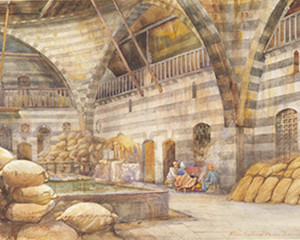We have in the East great khans, but they bear little relation to our hotels. Ring, eat, and pay, is not the law in the East. They have no bells in Damascus, nor even the silver call or whistle which our grandmothers used in England. Bells in churches and in houses are alike an abomination to the Moslems; and the Maronites alone, by permission of the Government, have a right to use them.
东方有大可汗,可汗不同于我们所说的宾馆。按铃点餐、就餐、结账在东方都是不合法的。大马士革没有钟,甚至没有我们英国的祖母辈们使用的银铃和口哨,因为穆斯林极其厌恶在教堂或者屋子里挂钟,只有获得政府许可的马龙派教徒才能使用。
The Khan in Damascus is a large circular building surmounted by a noble dome, in which the great merchants have their goods and wares of all kinds; and in which the traveller can find a resting-place for himself and his camels, and be supplied with water from the central fountain;—but there are no tables spread for the travellers, and no beds ready made for the weary pilgrims: you must find your dinner as you best can, make your own bed, and when you rise, take it up, and walk. The Khan is, however, a very noble building, and excites not a little astonishment among the Orientals.
大马士革的可汗是一种高大的圆形建筑,顶部是气派的圆顶,大商贩们会在这里存放自己各种各样的东西和货物;过往的游客和骆驼们也会在这里歇歇脚,这里为他们提供中央喷水池的水喝,但是不会为他们准备桌子,也不会为疲惫的朝圣者准备床铺,你必须自己为自己找寻尽量好些的食物,自己为自己准备床铺,起床收拾好之后就可以离开了。不管怎么说,可汗在东方人眼里是一种特别尊贵的建筑,往往会令他们叹为观止。

In European cities your attention is arrested by bookshops, pictures, placards, caricatures, &c.; now in Damascus we have nothing of the sort. Among the Jews you may find a few miserable stalls, from which you may pick up a copy of the Talmud, or some old rabbinical prayer-book. The sheikh? who sold me the Koran, laid his hand upon his neck, and told me to be silent, for were it known that he had done so, he might lose his head. In the schools they are taught only to read the Koran, and to master the simplest elements of arithmetic and writing.
书店、画、广告牌、人物漫画等在欧洲的城市里极具吸引力,但是这些在现在的大马士革都没有。或许你能在犹太人生意惨淡的小摊里找到一本复印版犹太法典或者一些陈旧的希伯来语祈祷书,有一个大概是伊斯兰教教长的人?卖给了我一本《古兰经》,他当时把手横在自己的脖颈上让我不要把这事儿透露出去,因为一旦有人知道了他可能就会丧命。学生们在学校里只学习《古兰经》以及掌握最简单的算术和写作的要领。













